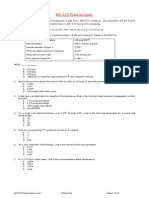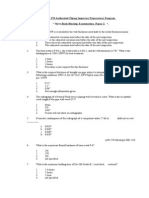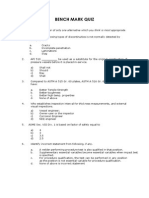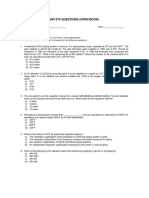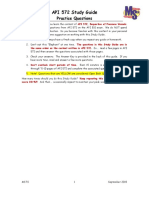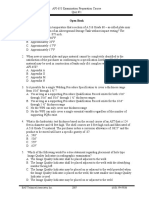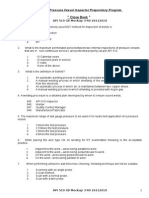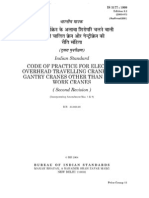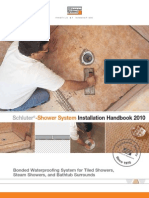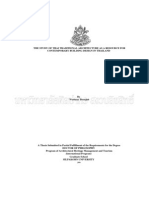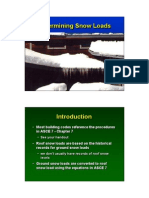0 ratings0% found this document useful (0 votes)
175 views11.API 574 Practive Qns
11.API 574 Practive Qns
Uploaded by
vamsikrishnaThis document discusses piping inspection terminology and practices, including the Barlow formula for determining pipe thickness, corrosion rates, and methods for measuring pipe-to-soil potentials. Key points covered include what various terms in the Barlow formula represent, how to calculate required pipe wall thickness based on pressure, temperature and material properties, and the importance of accurate inspection records for evaluating a piping system's service life.
Copyright:
© All Rights Reserved
Available Formats
Download as DOCX, PDF, TXT or read online from Scribd
11.API 574 Practive Qns
11.API 574 Practive Qns
Uploaded by
vamsikrishna0 ratings0% found this document useful (0 votes)
175 views6 pagesThis document discusses piping inspection terminology and practices, including the Barlow formula for determining pipe thickness, corrosion rates, and methods for measuring pipe-to-soil potentials. Key points covered include what various terms in the Barlow formula represent, how to calculate required pipe wall thickness based on pressure, temperature and material properties, and the importance of accurate inspection records for evaluating a piping system's service life.
Original Description:
API 574 Practice questions
Copyright
© © All Rights Reserved
Available Formats
DOCX, PDF, TXT or read online from Scribd
Share this document
Did you find this document useful?
Is this content inappropriate?
This document discusses piping inspection terminology and practices, including the Barlow formula for determining pipe thickness, corrosion rates, and methods for measuring pipe-to-soil potentials. Key points covered include what various terms in the Barlow formula represent, how to calculate required pipe wall thickness based on pressure, temperature and material properties, and the importance of accurate inspection records for evaluating a piping system's service life.
Copyright:
© All Rights Reserved
Available Formats
Download as DOCX, PDF, TXT or read online from Scribd
Download as docx, pdf, or txt
0 ratings0% found this document useful (0 votes)
175 views6 pages11.API 574 Practive Qns
11.API 574 Practive Qns
Uploaded by
vamsikrishnaThis document discusses piping inspection terminology and practices, including the Barlow formula for determining pipe thickness, corrosion rates, and methods for measuring pipe-to-soil potentials. Key points covered include what various terms in the Barlow formula represent, how to calculate required pipe wall thickness based on pressure, temperature and material properties, and the importance of accurate inspection records for evaluating a piping system's service life.
Copyright:
© All Rights Reserved
Available Formats
Download as DOCX, PDF, TXT or read online from Scribd
Download as docx, pdf, or txt
You are on page 1of 6
BASIC PIPING INSPECTION,
TERMINOLOGY AND RP 574- PRACTICE
Qs
1. In the Barlow formula for determining pipe thickness, the term S
stands for
a. Internal design gage pressure of the pipe in psi.
b. Pressure design strength for internal pressure, in inches
c. Allowable unit stress at the design temperature, in psi
d. Maximum strain at the average operating temperature, in psi
2. At low pressure and temperatures, the thickness determined by the
Barlow formula may be so small that the pipe would have ______
structural strength.
a. Adequate
b. Insufficient
c. Ample
d. Good
3. A seamless NPS 12, A-106 Grade A pipe operators at 300 F and 941
psi.The allowable stress is 16000 psi. Using the barlow Equation,
determine the thickness required for these conditions
a. 0.375
b. 0.750
c. 0.353
d. 0.706
4. A seamless NPS6, A-106 Grade A pipe operators at 300F and 941
psi. The allowable stress is 16000 psi. The owner- user specified that
the pipe must have 0.1 allowed for corrosion allowance. Using the
Barlow equation, determine the thickness required for these
conditions
a. 0.295
b. 0.195
c. 0.277
d. 0.706
5. A seamless NPS 8, A-53 Grade B pipe operators at 700F and
700psi.The allowable stress is 16500 psi. The pipe has been in service
for 6 years. The original wall thickness of the pipe was 0.375. The
pipe wall now measures 0.30. considering no structural requirements,
estimate how long the piping can continue to operate and not be
below the minimum thickness.
a. 4.68 years
b. 9.8 years
c. 0 years , pipe now below minimum
d. 10.42 years
6. An inspectors finds a thin area in the body of a NPS 8 (8.625 O.D) 600
gate valve. The valves body is made from ASTM A216 WCB material.
The system operates at 700 psi and 750F.Using a corrosion allowance of
0.125 what thickness must be present in order to continue to safety
operate? Round to nearest hundredth.
a. 0.48
b. 0.38
c. 0.51
d. 0.43
7. If corrosion or erosion is anticipated for a valve, what should be done
prior to installing the valve?
a. Severance thickness determinations should be made when
then valves are installed so that the fretting rate and metal
ruination can be determined
b. Retirement thickness measuremetns should be made after
installations so that the fatigue rate and metal loss can be
determined
c. Reference thickness measurements should be made when the
valves are installed so that the corrosion rate and metal loss
can be determined
d. Retina measurement of the macula should be made when
the iris are installed so the optical rate and losses of
perception can be determined.
8. Which of the items listed below would NOT normally be contained
in inspection records of piping?
a. Original date of installation, the specifications and strength
levels of the materials used.
b. Original vessel hydrotest pressure and conditions that the
tests were performed under
c. Original thickness meaursements and the locations and dates
of all subsequent readings
d. Calculated retirement thicknesses
9. Accurate records of a piping system make possible an evaluation of
___________on any piping, valve or fitting
a. Computerization
b. Security and continuity
c. Cost and competency
d. Service life
10. You are working as an inspector. While reviewing a tabulation of
thickness data on a section of piping in no- corrosive or very low
corrosive service, you find the initial thickness reading of an
inspection point to be 0.432. and marked nominal on a NPS 6 pipe. At
the next inspection 12 months later UT readings were taken and the
thickness at the point was still 0.378 what would this mean to you?
a. No measurement was taken originally, the nominal thickness
was listed and the piping probably had an under- tolerance of
12.5%
b. There was an error made by the inspector at the installation
or the inspector who UTd the piping at the next inspection
made an error.
c. The UT machine that the inspector used during the 12 month
inspection after installation was defective and not reading
correctly
d. The pipe contractor or the installer put the wrong schedule
piping in service
11. You are working as an inspector. While reviewing a tabulation of
thickness data on a section of piping, you find a letter C marked
under under a column headed by the word METHOD. What does the
C indicate?
a. The inspection temperature of the pipe was COLD.
b. The thickness measurement was made by inspector with the
I.D of C
c. Thickness measurement was taken with calipers
d. The thickness measurement was CONFIRMED by second
party
12. Which of the following is not an important function of an accurate
sketch?
a. Assist in determining future locations that urgently require
examinations
b. Identifying systems and circuits in terms of location, site
material etc
c. Serve as field data sheets
d. None of the above
13. As soon as possible after completing an inspection, the inspector
should
a. Review the inspection records and schedule the next
inspection
b. Always require a hydrotest
c. Sign all RT records
d. Notify the piping engineer, so he can wake up and go home
14. The wenner 4 pin methods, the soil bar, and the soil box do not
represent methods of determining:
a. Holidays
b. Pipe-to-soil potentials
c. Cathodic protection acceptability
d. All of the above
15. The total resistivity for a wenner 4 pin test that utilize pins spaced
2 feet apart and a 6 R factor is :
a. 2298 ohm/cm
b. 3500ohm/cm
c. 6000ohm/cm
d. 8000ohm/cm
16. Which of the following is not a consideration when using a soil
bar?
a. Using a standard prod bar
b. Avoiding the addition of water
c. Applying pressure on the soil bar after injection
d. None of the above
17. Which of the following is a consideration when using a soil box
a. Depth of pins less than 4 % of spacing
b. Ensuring the soil has dried out before testing
c. Avoiding contamination of the sample during handling and
storage
d. All of the above
You might also like
- API-570 Final Exam QuestionsDocument26 pagesAPI-570 Final Exam QuestionsAndiappan Pillai88% (26)
- API 570 Mock Up Open Book Questions 26Document13 pagesAPI 570 Mock Up Open Book Questions 26Ravindra S. Jivani100% (2)
- Architectures of TimeDocument251 pagesArchitectures of Timeahutz100% (2)
- API 570 Final Practice ExamDocument23 pagesAPI 570 Final Practice ExamAndiappan PillaiNo ratings yet
- API 510 Mathematical CalculationsDocument26 pagesAPI 510 Mathematical Calculationsglazetm100% (1)
- API 510 Data SheetsDocument11 pagesAPI 510 Data SheetshahahNo ratings yet
- API 510 Exam OpenDocument3 pagesAPI 510 Exam OpenalouisNo ratings yet
- API 570 Closed Book Question PaperDocument41 pagesAPI 570 Closed Book Question Papervamsikrishna78% (9)
- Practice Questions For Api RP 577: 60 TérminosDocument7 pagesPractice Questions For Api RP 577: 60 TérminosvamsikrishnaNo ratings yet
- Practice Questions For API RP 577Document17 pagesPractice Questions For API RP 577vamsikrishna100% (5)
- Bar Bending ScheduleDocument15 pagesBar Bending ScheduleNAqash ArshadNo ratings yet
- Jean Prouvé & Marcel BreuerDocument8 pagesJean Prouvé & Marcel BreuerYosaphat Kiko Paramore DiggoryNo ratings yet
- M50 - Design of Integral BridgesDocument7 pagesM50 - Design of Integral BridgeslovehackinggalsNo ratings yet
- Chapter 4 - Colour in Images and VideoDocument39 pagesChapter 4 - Colour in Images and VideoZeeshan BhattiNo ratings yet
- API 510 PC 20 31 Aug05 Bench MarkDocument4 pagesAPI 510 PC 20 31 Aug05 Bench MarknikafiqNo ratings yet
- FINAL EXAMINATION API 570 Open BookDocument3 pagesFINAL EXAMINATION API 570 Open BookdenarlijeronNo ratings yet
- 9.API 574 Practive QnsDocument6 pages9.API 574 Practive QnsvamsikrishnaNo ratings yet
- Examination Question 510Document12 pagesExamination Question 510ohengjkt100% (1)
- Final Examination #1: Open Book Questions (1 50)Document29 pagesFinal Examination #1: Open Book Questions (1 50)kiho sung100% (1)
- Non-Destructive Evaluation of Corrosion and Corrosion-assisted CrackingFrom EverandNon-Destructive Evaluation of Corrosion and Corrosion-assisted CrackingNo ratings yet
- 15 API 570 - Open Book Mockup Exam FinalDocument12 pages15 API 570 - Open Book Mockup Exam FinalMichael Albuquerque100% (1)
- API-570 - Data Sheets (2018 Test)Document6 pagesAPI-570 - Data Sheets (2018 Test)mahmoud alwasif100% (1)
- Api 578 Question - 02Document2 pagesApi 578 Question - 02korichiNo ratings yet
- Api 653 Exam 2018Document21 pagesApi 653 Exam 2018Akram AlhaddadNo ratings yet
- Exam July 2021Document16 pagesExam July 202101280724321 Helmy100% (1)
- 10 MCQS API 510 Anees Ul HasnainDocument126 pages10 MCQS API 510 Anees Ul HasnaintayyabNo ratings yet
- API 510 QUIZ No.4Document5 pagesAPI 510 QUIZ No.4Hatem RagabNo ratings yet
- API 510 PC 20 31 Aug05 Final Exam OpenDocument4 pagesAPI 510 PC 20 31 Aug05 Final Exam OpennikafiqNo ratings yet
- API RP 572 QuizDocument17 pagesAPI RP 572 Quizamalhaj2013No ratings yet
- Api 510 Close Book (Sec Viii & 510) - 17Document12 pagesApi 510 Close Book (Sec Viii & 510) - 17walid walid100% (1)
- API 570 Calcs Summary Page 1 of 6: T Required (Minimum Required Thickness) CalcsDocument6 pagesAPI 570 Calcs Summary Page 1 of 6: T Required (Minimum Required Thickness) CalcsIbtehaj ManiNo ratings yet
- API 570 Day 5 Book (1 To 130)Document137 pagesAPI 570 Day 5 Book (1 To 130)melvinNo ratings yet
- API 570 Course Model Test 9Document5 pagesAPI 570 Course Model Test 9Ismail Jamaluddin100% (1)
- Preguntas API 570Document177 pagesPreguntas API 570David OrtegaNo ratings yet
- API 578 Questions - 01Document2 pagesAPI 578 Questions - 01korichiNo ratings yet
- Api 570 199-352Document86 pagesApi 570 199-352nancyNo ratings yet
- Closed Book Api 572-A (55-65) - 2Document11 pagesClosed Book Api 572-A (55-65) - 2slxanto100% (1)
- Daily Points To Recall (Day 3) : API 653 PreparatoryDocument2 pagesDaily Points To Recall (Day 3) : API 653 PreparatoryMohammed ShakilNo ratings yet
- API 570 DemoDocument6 pagesAPI 570 Demojaire esparza100% (1)
- API 572 Pracrise QuestionsDocument40 pagesAPI 572 Pracrise QuestionsRizwan Nazir100% (2)
- Api 578-Mock 1 - KeyDocument28 pagesApi 578-Mock 1 - Keysheikmoin100% (1)
- Api 510 Close Book - 4Document20 pagesApi 510 Close Book - 4tayyabNo ratings yet
- Final Exam (Closed Book) : Answer SheetDocument13 pagesFinal Exam (Closed Book) : Answer SheetDAMIAN ALEJANDRO100% (1)
- API-510 Exam # 3 2008 Open Book Exam PDFDocument14 pagesAPI-510 Exam # 3 2008 Open Book Exam PDFIslam FawzyNo ratings yet
- Practice Questions (Closed) : Asme Section Viii, Div. IDocument30 pagesPractice Questions (Closed) : Asme Section Viii, Div. Ihoussem khelilNo ratings yet
- API 570 Final Exam Close Book Questions 23Document10 pagesAPI 570 Final Exam Close Book Questions 23Ravindra S. Jivani100% (1)
- CIC API 570 (8) Api-578Document44 pagesCIC API 570 (8) Api-578Ibrahim EldesokyNo ratings yet
- Api 510Document7 pagesApi 510Ranaweera AriyamanjulaNo ratings yet
- Sample Questions For API 570 EDocument14 pagesSample Questions For API 570 Eمبشر أحمدNo ratings yet
- 2 - API 570 Exam B (150 Q&A)Document33 pages2 - API 570 Exam B (150 Q&A)Dabbar Taher100% (1)
- API 653 Quiz 1Document3 pagesAPI 653 Quiz 1fazeel mohammedNo ratings yet
- API 570 - CL Book 111122112010 R0... Mockup 3Document18 pagesAPI 570 - CL Book 111122112010 R0... Mockup 3patvinderNo ratings yet
- Api 570 Quiz-2Document34 pagesApi 570 Quiz-2jacquesmayol50% (2)
- API 510 CB Mockup 3 R0 26112010Document18 pagesAPI 510 CB Mockup 3 R0 26112010essnelsonNo ratings yet
- A) 1.7 To 4.0 B) 2.55 To 3.9 C) 2.0 To 4.0 D) None of TheseDocument17 pagesA) 1.7 To 4.0 B) 2.55 To 3.9 C) 2.0 To 4.0 D) None of TheseAshish Patel100% (1)
- Api 578-Mock 1Document27 pagesApi 578-Mock 1sheikmoin100% (1)
- Sis Book1Document99 pagesSis Book1Hamza AlamNo ratings yet
- API 510 - DAY 3: G T Technical & Management Institute PVT - LTD.Document102 pagesAPI 510 - DAY 3: G T Technical & Management Institute PVT - LTD.hamedNo ratings yet
- API 510 Course Puspatri Apr 09Document185 pagesAPI 510 Course Puspatri Apr 09ahmedelhajNo ratings yet
- 570 Sample Questions Rev 061815Document2 pages570 Sample Questions Rev 061815Amal KaNo ratings yet
- 1st April 2021 653 PaperDocument7 pages1st April 2021 653 Papermohamed haMEEM100% (1)
- API 570 Day 4 BookDocument80 pagesAPI 570 Day 4 BookZaidi AftabNo ratings yet
- API 570-Final Model Exam-Open Book Without AnswersDocument6 pagesAPI 570-Final Model Exam-Open Book Without Answersbanana100% (1)
- 177538089-API-570-Final-Exam-Questions - REALIZARDocument26 pages177538089-API-570-Final-Exam-Questions - REALIZARALe Infinito100% (2)
- Api 570Document63 pagesApi 570Ramzi BEN AHMED100% (1)
- API 510 Final Model Exam-Open Book Page 1 of 6Document6 pagesAPI 510 Final Model Exam-Open Book Page 1 of 6jay2kay5793No ratings yet
- 2#tusr) API-570 SAMPLE Open Book ExamDocument8 pages2#tusr) API-570 SAMPLE Open Book ExamAshish PatelNo ratings yet
- Is 3177 Eot CraneDocument62 pagesIs 3177 Eot CraneDnyanesh Bhalerao75% (4)
- Quiz 4Document3 pagesQuiz 4vamsikrishnaNo ratings yet
- 1.510 Sample QuestionSDocument7 pages1.510 Sample QuestionSvamsikrishnaNo ratings yet
- API 575 Practice QuestionsDocument32 pagesAPI 575 Practice QuestionsvamsikrishnaNo ratings yet
- Closed Book Questions For Api 575Document25 pagesClosed Book Questions For Api 575vamsikrishna100% (1)
- Practice Questions For API RP 577Document10 pagesPractice Questions For API RP 577vamsikrishnaNo ratings yet
- As 4204-1994 Headstones and Cemetery MonumentsDocument7 pagesAs 4204-1994 Headstones and Cemetery MonumentsSAI Global - APACNo ratings yet
- Asher Michael - Writings1973 1983OnWorks1969 1979 - 1973 1983Document125 pagesAsher Michael - Writings1973 1983OnWorks1969 1979 - 1973 1983emprexNo ratings yet
- Housing Plan (Bungalow)Document16 pagesHousing Plan (Bungalow)Classic Bobby100% (2)
- Flood CompactionDocument32 pagesFlood CompactionsamNo ratings yet
- Computer Pricelist PDFDocument2 pagesComputer Pricelist PDF汮豪No ratings yet
- Allan Jacobs Donald Appleyard - Toward An Urban Design Manifesto PrologueDocument10 pagesAllan Jacobs Donald Appleyard - Toward An Urban Design Manifesto ProloguegamescraftsNo ratings yet
- 02 Observation Along The Sabarmati PDFDocument42 pages02 Observation Along The Sabarmati PDFAr Arunima RaneNo ratings yet
- Kerdi Shower HandbookDocument40 pagesKerdi Shower Handbookexothermal360No ratings yet
- Door Building in Details: InstallationDocument53 pagesDoor Building in Details: InstallationkockioNo ratings yet
- ASR9000Document1,152 pagesASR9000aloxodngNo ratings yet
- Bof 4Document100 pagesBof 4Nur Eka SupratamaNo ratings yet
- WillyDev VB6aNETDocument719 pagesWillyDev VB6aNETJoan Costa CostaNo ratings yet
- How To Configure The Guest Domains On LDOMDocument15 pagesHow To Configure The Guest Domains On LDOMrajlvuNo ratings yet
- Lesson 5Document46 pagesLesson 5allyssabernadettellaneslariosaNo ratings yet
- Boonjub THAI ARCHITECTURE PDFDocument272 pagesBoonjub THAI ARCHITECTURE PDFDhamma_Storehouse50% (4)
- Civil Registration Service Appointment SlipDocument2 pagesCivil Registration Service Appointment SlipYna I Group 3No ratings yet
- Arc - 403Document11 pagesArc - 403Apoorva SinghNo ratings yet
- ScascDocument36 pagesScascMaxi SchremmelNo ratings yet
- How To Create Enhancement SetDocument3 pagesHow To Create Enhancement SetArpit ChoudharyNo ratings yet
- Snow Load BasicsDocument26 pagesSnow Load Basicssamir_ssh7151No ratings yet
- Estimation of Long-Term Prestress Losses in Post-Tensioned GirdersDocument10 pagesEstimation of Long-Term Prestress Losses in Post-Tensioned GirdersManuel Palomino pozoNo ratings yet
- iONDigitalAssessment TypingTest v1.0 Apr2017Document19 pagesiONDigitalAssessment TypingTest v1.0 Apr2017ShubhamAuspiciosoGothwal0% (1)
- History QuestionAnswerDocument20 pagesHistory QuestionAnswerDessNo ratings yet
- 21 PDFDocument22 pages21 PDFMaltin SelmanllariNo ratings yet
- Tayabas QuezonDocument19 pagesTayabas Quezonairtarlac0% (1)
